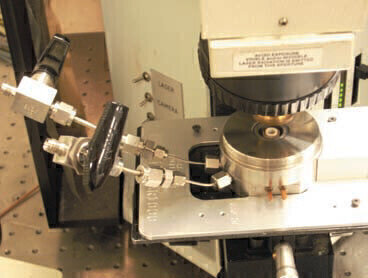Mass Spectrometry & Spectroscopy
Temperature Controlled Stage Used as a Mini-Reactor to Study Heterogeneous Catalysis
Apr 26 2012
Researchers at the University of South Carolina are using the Linkam CCR1000 stage as a mini-reactor (in-situ Raman cell). They are using Raman spectroscopy to investigate the oxidation of carbon monoxide over rhodium based catalysts (zeolite and alumina are used as supports). Specifically, they are looking at the structure and morphology of the active sites of rhodium containing catalysts under working conditions. They apply variable techniquesto determine the metal electronic state and its coordination environment (in case of supported rhodium complexes) during the catalytic cycle. Raman spectroscopy is used to understand the activity of rhodium oxide species. Catalysis by ‘single site’ catalysts is of particular interest to the researchers.
The catalysts are prepared in a nitrogen atmosphere and generally should be considered as air and water sensitive materials. Therefore, the team have to load the samples in the reactor/cell (CCR1000) in a glove box filled with nitrogen. Two valves have been installed on the CCR1000 so they are able to transfer the cell to the Raman spectrometer to avoid contact with air. At the spectrometer, they connect it to the gas distribution system allowing the
CO/O2/He mixture to flow right through the reactor/cell.
The main objective of the experiment is to follow formation and possibly decomposition of rhodium oxide species on a surface of supports during carbon monoxide oxidation at different temperatures. They explain “the motivation for our research is basically gaining fundamental knowledge on the catalysis by ‘non-metallic’ species. In other words, we are looking at the catalysis by supported metal clusters (4-10 atoms) or supported metal complexes (1 atom). At this scale catalyst properties change drastically which often results in enhanced catalytic activity.” When asked about the Linkam system they also noted the 'big advantage is a precise temperature control which is important when doing multiple experiments at different temperatures.'
Digital Edition
International Labmate 49.6 - Sept 2024
September 2024
Chromatography Articles - HPLC gradient validation using non-invasive flowmeters Mass Spectrometry & Spectroscopy Articles - From R&D to QC, making NMR accessible for everyone: Putting NMR...
View all digital editions
Events
Oct 30 2024 Birmingham, UK
Oct 30 2024 Manchester, UK
Nov 11 2024 Dusseldorf, Germany
Nov 12 2024 Cologne, Germany
Nov 12 2024 Tel Aviv, Israel



















